MercoPress. South Atlantic News Agency
Tag: democracy
-
Monday, February 11th 2019 - 08:33 UTC
Guaidó warns Venezuelan military that blocking humanitarian aid is a “crime against humanity”
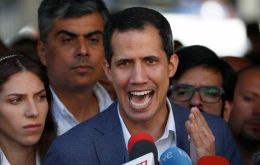
Opposition leader Juan Guaido, recognized by some 50 countries as Venezuela's interim president, warned the military on Sunday that blocking humanitarian aid from entering the country is a “crime against humanity.”
-
Friday, February 8th 2019 - 08:43 UTC
Humanitarian aid arrives to Cucuta, a bridge away from Venezuela

Trucks carrying humanitarian aid for crisis-stricken Venezuela arrived in the Colombian border city of Cucuta on Thursday as diplomatically-isolated President Nicolas Maduro appeared set to block its entry amid an escalating political crisis.
-
Thursday, February 7th 2019 - 16:57 UTC
EU calls for free elections in Venezuela at International Contact Group meeting in Montevideo

The High Representative of the European Union (EU) for Foreign Affairs and Security Policy, Federica Mogherini warned on Thursday at the meeting of the International Contact Group in Montevideo, on a beside the president of Uruguay, Tabaré Vázquez, that the group does not seek a “direct negotiation” but a free, transparent and credible Presidential election in Venezuela.
-
Wednesday, February 6th 2019 - 09:22 UTC
“Neutral” Uruguay's name mentioned in attempts to drain Venezuelan coffers

A bank in Portugal has blocked Venezuela’s attempt to transfer US$ 1.2 billion to Uruguay, a lawmaker said on Tuesday as the opposition to President Nicolas Maduro warned of the theft of public funds, while the United States sent food and medical aid to the Venezuelan-Colombian border.
-
Tuesday, February 5th 2019 - 09:07 UTC
European allies bend to join 'gringo empire' approach

The decision to promote Juan Guaidó as a rival president to Nicolás Maduro in Venezuela was clearly made in Washington, not in Caracas. The speed with which U.S. allies in the Americas and western Europe recognised Guaidó’s claim on Jan. 23 to be the legitimate president of Venezuela would not have been possible without a lot of prior coordination — and a lot of pressure by the Trump administration.
-
Tuesday, February 5th 2019 - 08:58 UTC
Latin American countries call on Venezuelan military to support interim president Juan Guaidó
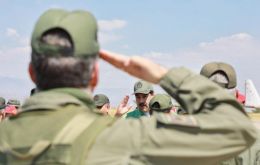
A group of Latin American countries and Canada has urged the Venezuelan military to support opposition leader Juan Guaidó as interim president. In a statement, 11 of the 14 members of the Lima Group called for a change of power without the use of force and the urgent delivery of humanitarian aid.
-
Friday, February 1st 2019 - 10:25 UTC
EU Parliament recognizes Guaidó as de facto head of state: 90 days for Venezuela to hold new elections
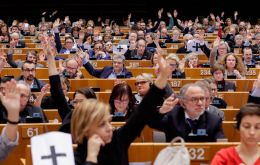
The European Parliament recognized Venezuela’s self-declared interim president Juan Guaido as de facto head of state on Thursday, heightening international pressure on the OPEC member’s socialist President Nicolas Maduro. EU governments, divided over whether to recognize Guaido, also agreed to lead an international crisis group with South American nations to seek new elections, setting a 90-day time limit, and threatening further economic sanctions.
-
Friday, February 1st 2019 - 10:15 UTC
Guaidó denounces Maduro intelligence forces intimidation against his family
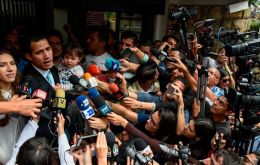
Declared interim president Juan Guaido said on Thursday that agents from a feared special police unit had called at his home and asked for his wife, who was out at an event with her husband while their 20-month-old daughter was at their residence.
-
Wednesday, December 19th 2018 - 14:30 UTC
Macri urges Mercosur to take action against “Venezuelan dictatorship”
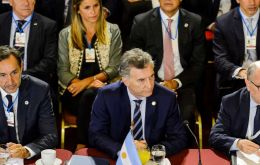
Argentine President Mauricio Macri Tuesday launched an appeal in Montevideo to find solutions to the humanitarian crisis in Venezuela and called for the “return of democracy” in that country. He delivered that speech during the Mercosur summit where he is to take up the bloc's rotating presidency from host Tabaré Vázquez.
-
Monday, December 3rd 2018 - 15:24 UTC
Uruguay rejects Peruvian ex-president Alan García's asylum petition
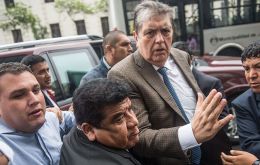
Uruguay’s President, Tabaré Vázquez announced Monday along with Uruguayan Foreign Minister Rodolfo Nin Novoa that Peruvian former president Alan García will not receive political asylum. The rejection of the request is due to the fact that in Peru “the three powers of the State operate” freely, said Vázquez.
